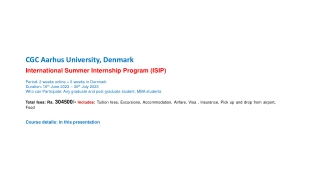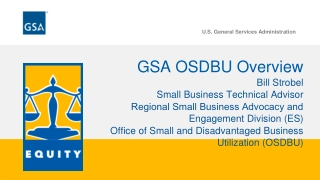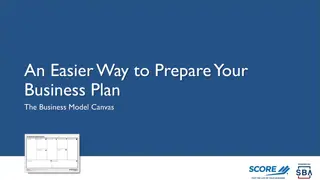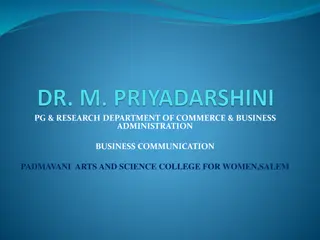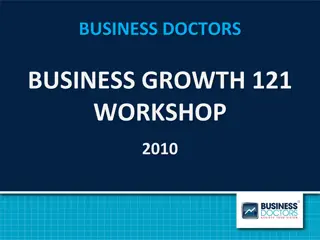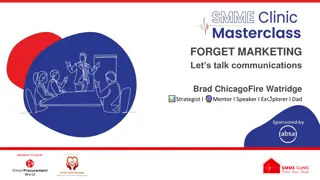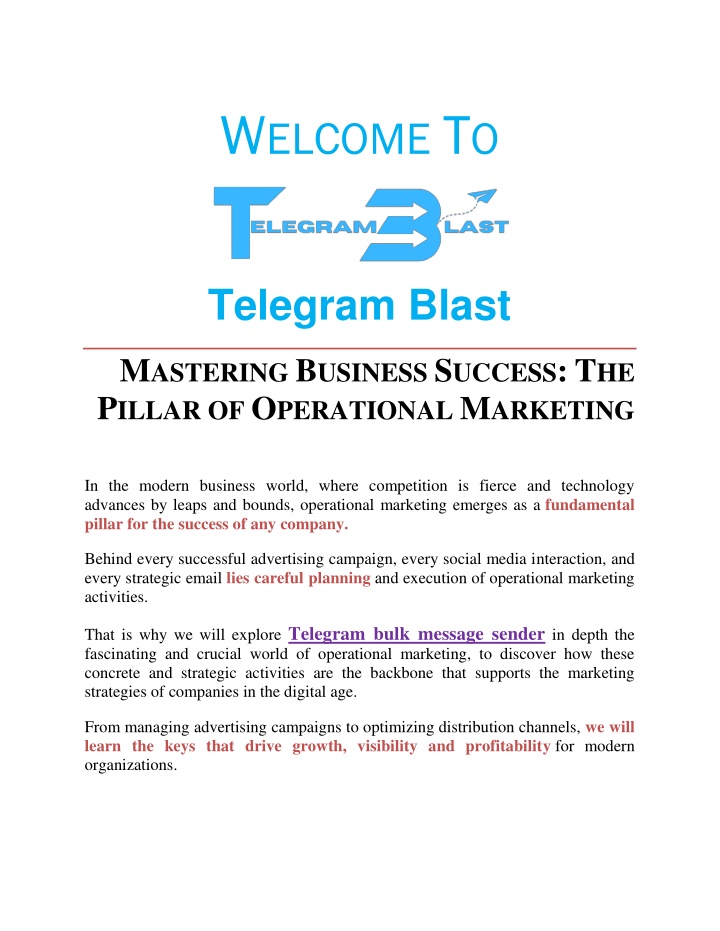
Mastering Business Success
Discover the pillar of business success with operational marketing Master key strategies for the growth of your business
Download Presentation

Please find below an Image/Link to download the presentation.
The content on the website is provided AS IS for your information and personal use only. It may not be sold, licensed, or shared on other websites without obtaining consent from the author. If you encounter any issues during the download, it is possible that the publisher has removed the file from their server.
You are allowed to download the files provided on this website for personal or commercial use, subject to the condition that they are used lawfully. All files are the property of their respective owners.
The content on the website is provided AS IS for your information and personal use only. It may not be sold, licensed, or shared on other websites without obtaining consent from the author.
E N D
Presentation Transcript
WELCOME TO Telegram Blast MASTERING BUSINESS SUCCESS:THE PILLAR OF OPERATIONAL MARKETING In the modern business world, where competition is fierce and technology advances by leaps and bounds, operational marketing emerges as a fundamental pillar for the success of any company. Behind every successful advertising campaign, every social media interaction, and every strategic email lies careful planning and execution of operational marketing activities. That is why we will explore Telegram bulk message sender in depth the fascinating and crucial world of operational marketing, to discover how these concrete and strategic activities are the backbone that supports the marketing strategies of companies in the digital age. From managing advertising campaigns to optimizing distribution channels, we will learn the keys that drive growth, visibility and profitability for modern organizations.
WHAT IS OPERATIONALMARKETING? It is a fundamental part of marketing that focuses on the implementation of strategies and tactics designed at the strategic and tactical level of marketing. In other words, it is about carrying out specific and executable actions that help achieve the advertising objectives of a company and/or brand. That is to say, it is the practical and executive part of marketing that focuses on carrying out specific actions to achieve the marketing objectives established in the strategy and application stages. Therefore, it is an essential part of any company's marketing management and requires careful planning and execution to achieve success in the market and achieve the goals that have been set out in the path forward that has been mapped out.
Features of operational marketing It is characterized by a series of key aspects that distinguish it from other areas of marketing and that are fundamental for its effective execution, from its orientation towards results, to its capacity for adaptation and its focus on efficiency, so its key aspects are: 1. CONCRETE ACTIONS It is distinguished by its focus on the implementation of specific and tangible actions that may include: Creation of advertisements. Execution of promotional campaigns. Development of content for social networks. Marketing event organization. While it may include many other areas, these are just a few, these activities are designed to translate marketing strategies into practical actions that generate measurable results. 2. RESULTS-ORIENTED It seeks clear and measurable results, which means that actions must have a direct impact on the company's business objectives, such as increasing sales, generating leads, improving brand visibility or increasing customer retention. The effectiveness of actions is evaluated through specific metrics and KPIs. 3. FOCUS ON THE SHORT TERM While strategic marketing is concerned with long-term vision and brand building, operational marketing is often focused on generating short-term results. This means that actions are designed to generate a quick return on investment and meet the company s immediate needs, such as meeting quarterly goals.
4. EFFICIENT IMPLEMENTATION Efficiency is a priority in operational marketing because it involves using resources effectively to control costs. Proper management of marketing budgets and process optimization are essential to ensure that actions are cost-effective and that resources are used effectively. 5. FLEXIBILITY AND ADAPTATION Because market conditions can change so quickly and easily, operational marketing must be flexible and able to adapt to new circumstances. This may involve adjusting strategies and tactics based on market responses, emerging trends, or competitor actions. 6. CONSTANT MEASUREMENT AND ANALYSIS Measurement and data analysis are pillars of operational marketing because metrics are used to evaluate the performance of actions in real time and to
make informed decisions. Constant analysis allows for identifying areas for improvement and adjusting strategies to maximize results. 7. INTERDEPARTMENTAL COORDINATION Since operational marketing involves a variety of activities and functions within a company, effective coordination between different departments is essential . This ensures that all parties involved are aligned on objectives and strategies, contributing to a more effective implementation of marketing actions. 8. USE OF TECHNOLOGICAL TOOLS Operational marketing benefits from advanced tools and technologies, and this includes everything from marketing automation software to data analytics tools, content management platforms, and customer tracking systems. These tools help to streamline operational activities and optimize decision-making, since the goal is to optimize and make profitable all possible work processes. 9. TIME PRESSURE Because of its focus on short-term results, operational marketing is often conducted under time pressure . Marketing teams must meet tight deadlines to launch campaigns, respond to market events, and make quick decisions to take advantage of opportunities. 10. CUSTOMER ORIENTATION Despite its focus on execution and results , operational marketing must always maintain a customer orientation. All actions are designed with the customer's needs and desires in mind , and seek to improve the customer experience in all interactions with the company.
SOME OF THE KEY ACTIVITIES IN OPERATIONALMARKETING There are some operational marketing activities that are essential to the success of businesses in a digital and competitive environment, as they allow brands to connect with their audience, increase online visibility and ultimately achieve their marketing and sales goals. 1. ADVERTISING CAMPAIGN MANAGEMENT This involves planning, creating and executing advertising campaigns across a variety of media. For example, a company like Nike might create an advertising
campaign highlighting its new sports products in television commercials, on social media, and through print advertising in sports magazines. 2. DATA ANALYSIS This activity involves collecting, analyzing, and using data to make informed decisions. An online store like Amazon could use data analytics to understand its customers purchasing behavior and offer personalized recommendations. 3. Content management Companies create and maintain engaging content for their audiences. An example is the content strategy of a fashion blog that publishes articles about the latest trends, style tips, and product reviews to attract its target audience. 4. SEO AND SEM OPTIMIZATION Businesses work to improve their visibility in search engines (SEO) and manage search engine advertising (SEM) campaigns to attract web traffic. For example, a travel agency may invest in online advertising to appear in search results when people search for summer vacations for their upcoming family trips. 5. EMAIL MARKETING Businesses design email campaigns to reach their audience and encourage engagement and sales. For example, a clothing store can send promotional emails with exclusive discounts to its subscribers. 6. SOCIAL MEDIA MANAGEMENT Businesses maintain social media profiles, interact with followers, and create content strategies . One example is a food company's social media management
that posts recipes, cooking tips, and answers customer questions on platforms like Instagram and Facebook. 7. CUSTOMER RELATIONSHIP MANAGEMENT (CRM) Use CRM systems to manage and maintain strong customer relationships . An example is a telecommunications interactions, such as service calls and complaints, to provide better customer service. that records customer company 8. PRODUCT DEVELOPMENT AND MANAGEMENT This involves researching, developing and launching new products or services, as well as making improvements to existing products. Apple is a company that is known for constantly releasing new versions of its iPhone devices with improved features. 9. PRICE AND DISCOUNT MANAGEMENT Companies determine pricing and promotion strategies to maximize profit margins . An example is an electronics store that offers special discounts during sales seasons such as Black Friday. 10. DISTRIBUTION CHANNEL MANAGEMENT Select and manage the most effective distribution channels to reach customers. An example is a food company that uses both physical stores and online stores to reach different market segments.
H HOW TO DETERMINE WHIC OW TO DETERMINE WHICH OPERATIONAL MARKETING STRATEGY Y MARKETING STRATEGY YOU SHOULD APPLY H OPERATIONAL OU SHOULD APPLY? ? Choosing the right operational marketing strategy depends largely on your company's goals, the market you're in, your available resources, and the characteristics of your audience. So here are some key steps to establishing which operational marketing strategy you should apply: Defining clear objectives: Before you begin any operational marketing strategy, you need to have clear objectives. Are you looking to increase sales, improve brand awareness, generate leads, or retain existing customers? Define your specific and measurable goals. Knowing your audience: Understand your target audience. Who are your ideal customers? What needs do they have? Where do they spend their time online? Gaining insight into your audience is critical to selecting the right marketing tactics.
Competitor analysis: Examine your competitors. What marketing strategies are they using? What works for them and what doesn t? Learning from your competition can help you identify opportunities and avoid common mistakes. Budget and resources: Assess your available budget and the human and technical resources you have at your disposal. Some operational marketing strategies may be costly or require specialized personnel, so you should adjust your choices accordingly. Evaluate marketing channels: Consider which marketing channels are most effective in reaching your audience. This can include digital media such as social media, email, SEO, SEM, as well as traditional media such as print advertising or events. Prioritizing tactics: Based on your goals, audience, and resources, prioritize the marketing tactics that you find most effective and that align with your overall strategy. This could include social media management, email campaigns, online advertising, SEO, and more.
Develop an operational marketing plan:Once youve selected your tactics, create a detailed plan that includes start and end dates, responsible parties, allocated budget, and tracking metrics. This plan will help you stay focused and consistent in implementation. Continuous measurement and analysis: Implement analysis tools and constantly monitor the performance of your strategies. Adjust your tactics based on the results and maintain a process of continuous improvement. Flexibility: Recognize that operational marketing must adapt to changing market conditions and consumer preferences. Be prepared to adjust your strategy as needed. Risk assessment: Consider the potential risks associated with your strategies, such as impact on brand reputation, unexpected costs, or changes in regulation. Develop contingency plans to address these risks if necessary. Ultimately, the operational marketing strategy you choose should be consistent with your business vision and long-term goals. Keep a focus on the customer, measure your results and adjust your tactics as your business and the market evolve. Flexibility and adaptability are key to success in operational marketing, so once you have all this clear, you will be able to choose the best operational marketing strategy for your company. So we want to ask you, with everything we have seen, which one do you think is the most ideal for you? Let us know in the comments.
Contact Us Website: https://www.tgblast.com Telegram: https://t.me/latestdat Whatsapp: 639858085805 Phone: 639858085805 Email: info@tgblast.com Address: Blk 34 Lot 5 Easthomes 3 Subd Estefania, Bacolod City, Philippines,6100


